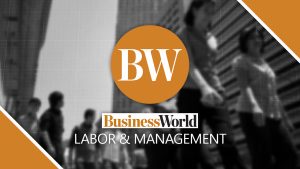Union appoints management expert to CBA panel

We have an upcoming negotiation with the employees’ union for a new Collective Bargaining Agreement (CBA). Last week, the union president sent us a list of their negotiating panel members, including a management expert from a high-end business school. I checked on the expert with my industry colleagues, who could provide no information. As the human resource head, I’m weighing the pros and cons of this new development. What are your thoughts? — Rainbow Connection.
There’s nothing new under the sun. Even the preceding statement is not new as it comes from Ecclesiastes 1:9, which reads: “What has been will be again, what has been done will be done again as there’s nothing new under the sun.” The world is round and everything will come to us in different forms and times, but the substance will remain the same.
But that’s not the issue. A management expert sitting on a union panel indicates that the union appears to be distrustful of management and line executives. It’s a bad start. Why would they hire an outsider to validate your claims and counter-proposals in the upcoming CBA negotiation?
Another thing to consider is whether the union is trying to play a psychological trick upon management.
FOUR OPTIONSThe outcome of the CBA will depend on a well-crafted management plan faithfully executed during the negotiation process. That means having a good roadmap that identifies potential hazards along the way. Speaking of hazards, what damage could an external management expert do to your negotiation process?
Such a union expert could derail the negotiating process if the expert decides to start lecturing the management panel and treat them like students. The expert’s behavior can be circumscribed by the negotiation ground rules, but there are no guarantees.
It’s very important to understand the underlying circumstances. The following suggestions may be helpful:
One, acknowledge the union proposal. Do it without delay. Request clarification of the union’s decision to involve an external management expert. I’m sure they have a reason. The question is whether the reason is valid to management. You must understand the entire picture and prepare a considered reply or offer a better option.
Two, reject the union proposal. If management is not convinced, it might be better to reject the proposal, but without being blunt. It might be necessary to initiate an informal discussion with union officials before finalizing your reply. You might bring up the potential for endless debate when an outsider is involved, resulting in unreasonable delays to the conclusion of the CBA.
Three, agree but limit the expert’s participation. This can be easily justified by the need for confidentiality in the negotiation process. Any information accessed by an outsider, no matter how professional, must be restricted, limited, or even denied in certain cases.
If necessary, accept only economic experts on a one-time engagement, who can talk about the consumer price index and inflation forecasts for the next three to five years. The trouble is that there is no consensus even among economic experts about the course of future events. This newspaper can attest to that.
Last, hire your own expert. If the union insists on the participation of its expert, management may propose its own third-party expert from the University of the Philippines School of Labor and Industrial Relations, the National Wages and Productivity Commission, or the National Conciliation and Mediation Board.
You may be tempted to propose hiring an expert from a competing trade federation. Don’t even think about it unless you want to antagonize the union negotiating panel.
BAD PRECEDENTIn conclusion, reject the proposal as best you can. Let the union agonize about justifying its proposal. If management is firm in its position and has explained it well, the union will surely come around to the folly of its position. Whatever you do, be professional and respectful in dealing with the union to avoid antagonizing the other side and complicating the negotiations.
Keep the discussion to what’s practical, right and inexpensive. Labor and management don’t need external experts unless they’re discussing technical issues; such experts are freely available from independent and reputable sources.
If you’ll agree, the presence of experts could be taken as precedent, and might embolden the union to propose more meaningless ideas.
Chat your questions with Rey Elbo on Facebook, LinkedIn or Twitter or send your feedback to elbonomics@gmail.com or via https://reyelbo.com




